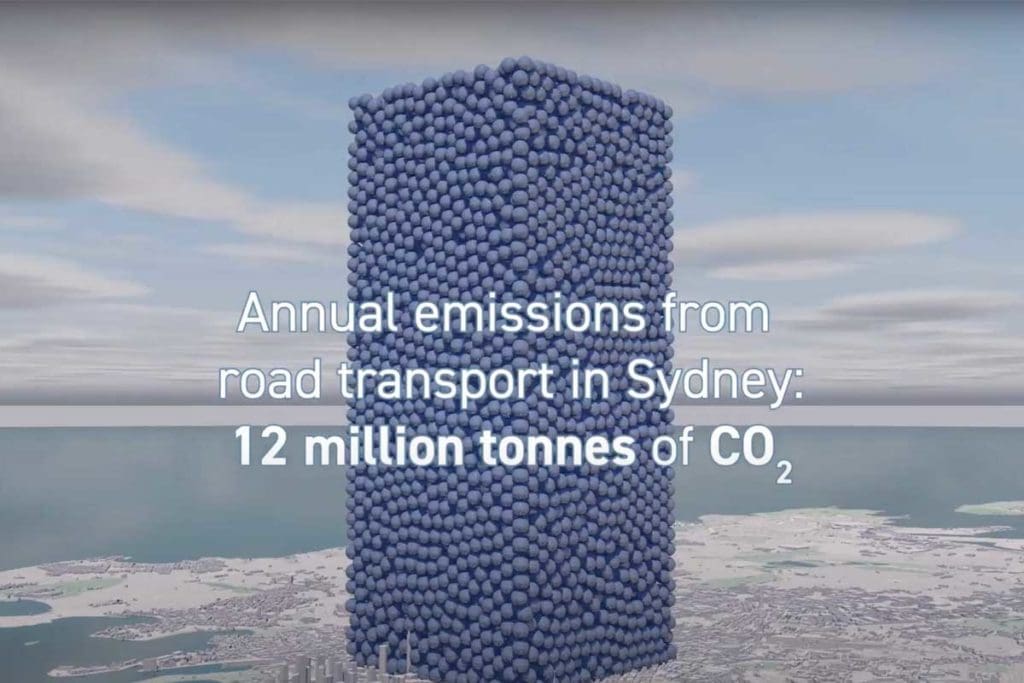High Beam on Road Transport Emissions for World Car Free Day

Adelaide, South Australia
Scooter share service provider Beam has marked World Car Free Day, on 22nd September, by releasing a graphic illustration of the road transport emissions in Australia’s capital cities.
Beam produced a video for each of the capital cities, using graphics to provide “visualisations of just how immense road transport emissions are in capital cities across Australia, as part of a campaign to encourage city residents to rethink their commute”.
“Riders are more likely to consider public transport … if they have the option to rely on e-scooters and e-bikes for first and last-mile transport.”
Australian census data from 2021 shows 91% of Australian households have at least one vehicle.
Previous data on Australian transportation, collected in 2016 and due to be updated later this year, show cars are the main form of transport and two in three Australians relied on the car for their work commute.
“While the data is concerning for the climate, it also highlights the immense potential for carbon emissions savings should Australians make changes to the way they undergo their daily commute,” according to a statement from Beam.
“Research from Beam – based on Australian rider surveys – revealed that 40% of riders are more likely to consider public transport as an option for long journeys, over cars or ridesharing, if they have the option to rely on e-scooters and e-bikes for first and last-mile transport.”
It says 48% of Beam riders reveal they already utilise e-scooters and e-bikes for their first and last-mile connections, with 22% of Beam riders saying they “always” or “usually” do as part of their trips in the city.
Sixty-eight percent of Beam riders revealed they were more likely to use an e-scooter and e-bike over a fossil-fuelled vehicle given the lesser environmental impact of a carbon-neutral ride.
“Beam riders are also calling on governments to aid them in their car free journeys, with 59% of surveyed riders calling for additional infrastructure for active transport, and 32% for increased public transport access,” the company says.
Beam General Manager ANZ Tom Cooper said Beam is calling on Australians to remember the environmental impact of their personal transport choices, and their ability to make a difference.
“It is obvious that a reduction of road transport emissions from fuel-powered vehicles in cities has a huge impact on a city’s carbon footprint, and users of e-mobility are riding the change,” Tom said.
“Our data shows 85% of Beam riders believe it is somewhat, very or extremely important to phase out petrol and diesel cars on the roads, showing the more access to and awareness of other modes of transport an Australian has, the more they are passionate about embracing alternate modes of transport.
“It is also very encouraging that in these early stages of shared micromobility being integrated into capital cities across Australia, our research is showing the potential for it to shift residents away from car usage.”
Brussels Leads Europe
More than 2,341 European towns and cities from 45 countries participated in European Mobility Week, which includes World Car Free Day and this year featured the theme ‘Better connections’.
“Car-free Sundays show the city’s potential as a place to meet, to relax, to enjoy.”
However, the Belgian capital of Brussels stood out with the extent of its activities to mark the event, which sought to foster synergies between people and places to promote behavioural change towards active mobility.
On Sunday 18th September, Brussels became Europe’s largest car-free zone, with the return of its Car-Free Sunday. The annual event provides a brief glimpse of an alternative urban landscape within the Belgian city, in which “streets are reclaimed from vehicles by the people, and active mobility, such as walking and cycling, is prioritised”.
“Car-free Sundays show the city’s potential as a place to meet, to relax, to enjoy. It shows the effect of redistributing public space, offering more space to active modes, such as pedestrians and cyclists,” says Brussels Mobility Minister Elke Van den Brandt.
It also provides fantastic insight to how effective restricting car use can be for reducing air and noise pollution. According to data from Brussels Environment, which compares one of Brussel’s busiest intersections on a normal day and Car-Free Sunday in 2021, there was a significant drop in the concentrations of several pollutants.
Elke said a recent survey indicated most Brussels residents support increasing the number of car-free days in the region, which the government is exploring with a strong intent to organise more.
A spokesperson for the Minister said the mayors of 19 municipalities are being consulted on the proposal and information is now being collected on the economic impact and how much an increase in car-free days will cost.
